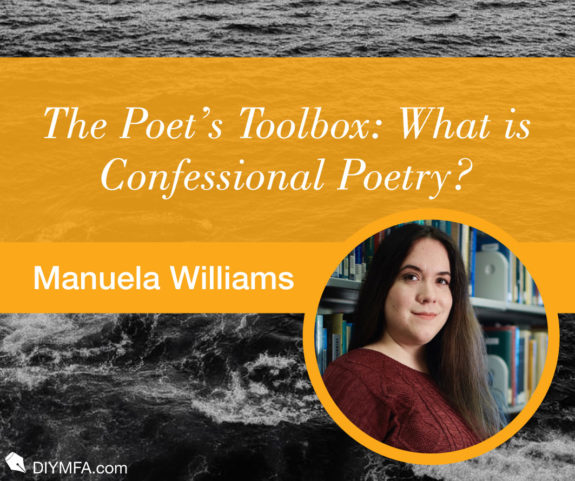Welcome back, poets! Today, I’m excited to talk about confessional poetry: a brief history, some defining characteristics, and a couple of exercises to help you get started writing confessional-style poetry of your own.
A (Very) Brief History of Confessional Poetry
In 1959, Robert Lowell’s Life Studies was published, a collection that would later be described as “confessional” by critic M.L. Rosenthal. In his review of Life Studies, Rosenthal wrote that Lowell’s collection read as “a series of personal confidences, rather shameful, that one is honor-bound not to reveal.” He concluded with the following impression of Lowell’s collection: “[it is] impure art, magnificently stated but unpleasantly egocentric—somehow resembling the triumph of the skunks over the garbage can.”
Ouch. Based on that review alone, one would assume Lowell’s work was incorrigibly self-centered and perhaps even too personal.
Indeed, at first glance, Lowell’s poems are markedly different from the Romantic poets that came before him. Rather than hiding behind allusion and metaphor, Lowell brought so-called “taboo” topics to the forefront of his poetry.
Lowell’s struggles with mental illness, his tumultuous relationship with his father, as well as his troubled marriage, are examined directly and written about with unflinching honesty throughout Life Studies.
In one of his most well-known poems, “Skunk Hour,” Lowell writes: “My mind’s not right.” I’d argue that such a personal declaration wouldn’t have appeared in earlier poetry (or, if such a sentiment did appear, it would most certainly have been obscured by the poet).
Though Rosenthal was apparently not a huge fan of the confessional mode, Robert Lowell’s influence can be seen in the work of Sylvia Plath, and elements of the confessional can also be seen in the poetry of Ted Hughes, Anne Sexton, W.D. Snodgrass, and John Berryman.
What Confessional Poetry Isn’t
Before continuing, I want to take a moment to unpack the idea that confessional poetry is somehow “unpleasantly egocentric,” as Rosenthal puts it. I strongly disagree!
Though Rosenthal brings up some interesting points in his review of Life Studies, I think his initial definition—and subsequent dismissal—of the confessional mode is quite limiting and disregards the potential for confessional poetry to speak to a more universal human experience.
While the work of “traditionally” confessional poets such as Lowell and Plath (and more contemporary poets such as Sharon Olds) examines particular sources of personal shame, guilt, and trauma, those sources aren’t inherently unique.
For example, in her 1992 collection, The Father, Sharon Olds traces her father’s illness and death through a series of narrative poems. While the interactions between the speaker and her father throughout the collection are rooted in specifics, it can be argued that the collection moves beyond the personal and “egocentric” by addressing and grappling with the common human experience of death.
While readers might not be able to identify with the specifics of Olds’s relationship with her father, they can identify, or empathize with, the emotions that arise out of a loved one’s illness and death.
In other words, I am of the mind that, while confessional poetry is certainly personal, it is in the sharing and reading of the personal that we are able to connect outwards with others who’ve experienced something similar.
Characteristics of Confessional-Style Poetry
The following isn’t meant to be a definitive list of what makes a confessional poem confessional. Instead, I’d describe it as a list of common characteristics of this type of poetry.
Some poets and poems fit more comfortably into this category than others. As a matter of fact, I’d argue that many contemporary poets borrow a lot from the confessional mode—it’s a large umbrella!
Contains autobiographical material.
In writing Life Studies, Robert Lowell drew on personal experiences, including his mental health struggles as well as his marriage.
Sylvia Plath drew on the similar subject matter in Ariel, but also expanded upon it. Her poem, “Lesbos,” for instance, reflects a venomous hatred towards the domestic.
More contemporary poets, such as Kaveh Akbar and Sharon Olds, further expand on the “types” of personal subject matter explored in confessional poetry. Akbar, in Calling a Wolf a Wolf, grapples with alcoholism. Olds has often explored childhood abuse in her work. In Felon, Reginald Dwayne Betts writes about his incarceration.
A prominent “lyric I.”
The “lyric I” refers to the first-person speaker in a poem. When the “lyric I” appears in a poem, many assume that it is the poet speaking. For instance, when Sylvia Plath writes a poem using the “lyric I” to describe a troubled marriage, one might assume that she is writing about her own marriage to Ted Hughes.
If you spot the first-person in a poem, it might be a clue that the poem is more personal in nature.
However, it’s important to not always conflate a first-person speaker with the poet, as the “lyric I” can sometimes serve different functions within a poem (like in the personal poems of Patricia Smith).
Writing Exercises
Now that you have a general idea of the history and common characteristics of confessional poetry, it’s time for you to try writing a confessional-style poem of your own. Here are some writing exercises to get you started:
Exercise 1: One misconception about confessional poetry is that, in order to write something truly “confessional,” one must have experienced trauma or suffering. While it’s true that many confessional and post-confessional poets write about traumatic events, it is not a prerequisite to writing in this style. I’d argue that, at the heart of confessional poetry, is a self or “I” who is trying to express something, whether that be suffering or some other emotion.
Your goal for this exercise is to write about an event that had a profound emotional impact on you. It does not need to be traumatic or upsetting in nature. Describe the event and emotions using figurative language. Play with the form of the poem. Invent a different “self” to insert into the poem. How do they behave?
Exercise 2: A common theme in early confessional poetry is the idea of shame/guilt. Write about something you feel particularly ashamed of (and remember–you don’t need to share what you write with anyone if you don’t want to!).
Tell us in the comments: Have you ever read confessional poetry? What did you think?

Manuela Williams lives and writes in Nevada. She is the author of two poetry chapbooks and one paranormal fiction novella. When she’s not writing, Manuela loves reading romance novels, drinking *all* the coffee, and playing video games. You can find her on Twitter.







